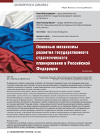Basic Mechanisms for Developing State Strategic Planning in the Russian Federation
DOI: https://doi.org/10.33917/es-6.180.2021.46-57
In modern conditions, implementation of sustainable progressive movement of the country by carrying out large-scale structural changes can be realized only on the basis of a centralized identification of areas, goals, priorities of socio-economic development, as well as indicators of strategies, programs and plans interconnected at all levels of the country’s national economy management. Methodologically the article is based on dialectical method of scientific knowledge, as well as systemic and institutional approaches. Scientific periodicals (monographs, scientific articles, etc.) and official documents of legislative and executive authorities of the Russian Federation on the issues of state strategic and long-term planning in Russia and the USSR were used as an information and analytical base. The article dwells on the following issues: 1) as a result of analysis of domestic and foreign literary sources, as well as regulatory and methodological guidelines in the field of state strategic planning, its main shortcomings were identified. According to the authors, these include: dissemination of program-targeted management methods not only into all spheres of socio-economic development, but also to the areas of budget allocations, the lack of sufficient information base of calculations; 2) methodological approach (stages, sequence of work, methods and procedures) to elaborating state programs for the economic development of the country, industries and regions is proposed; 3) application of the methods of hierarchies analysis (MHA) and network modeling (NPM) as the main methods for developing state programs is substantiated; 4) proposals on the composition and structure of the information base for calculating indicators of state programs are given.
Источники:
1. Kondrat’ev N.D. Izbrannye sochineniya [Selected Works]. Moscow, Ekonomika, 1993, 543 p.
2. Leont’ev V.V. Ekonomicheskie esse. Teoriya issledovaniya, fakty i politika [Economic Essays. Research Theory, Facts and Politics]. Moscow, 2003, 156 p.
3. Kantorovich L.V. Matematicheskie metody organizatsii planirovaniya proizvodstva [Mathematical Methods for Organizing Production Planning]. Moscow, Izd-vo Leningradskogo gosudarstvennogo universiteta, 1939, 67 p.
4. Afonina I.A., Ivanova O.D., Panasevich O.E. O konferentsii “Strategicheskoe planirovanie v usloviyakh narastaniya vneshnikh ugroz: neobkhodimost’ mobilizatsii vnutrennikh resursov dlya razvitiya Rossii” [On the Conference “Strategic Planning in the Face of Growing External Threats: the Need to Mobilize Internal Resources for the Development of Russia”]. Mikroekonomika, 2014, no 6, pp. 138–144.
5. Buzgalin A.V., Kolganov A.I. Vozrozhdenie planirovaniya, uroki (politiko-ekonomicheskii diskurs) [Revival of Planning, Lessons (Political and Economic Discourse)]. Problemy teorii praktiki upravleniya, 2016, no 1, pp. 8–18.
6. Bukhval’d E.M. Strategicheskii dolgostroi; viden li itog? [Strategic Long-Term Construction; is There Any Result?]. ETAP. Ekonomicheskaya teoriya, analiz, praktika, 2017, no 6, pp. 33–47.



